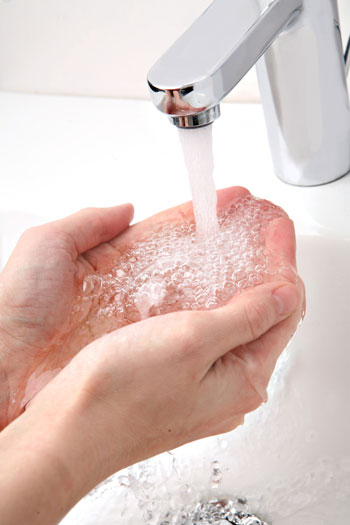5 (and Another 5) Tips to Avoid Eye Allergies
Who doesn’t like spring? Flowers are blooming, birds are singing, the grass is turning green, and the weather is warm. But as wonderful of a season as spring can be, it’s not always a pleasant time of year for allergy sufferers. Spring is the peak season for pollen, which can sometimes cause severe reactions upon entering the body.
If you live in the metro Atlanta area, you may be well aware of the region’s high pollen count every spring. Pollen is an allergen, which is released from various types of grasses, weeds, and trees. When pollen comes in contact with your eyes, if you’re allergic to it, your immune system will overreact, releasing histamines and other chemicals to fight it. This can cause the tiny blood vessels in your eyes to burst, leaving your eyes red, watery, swollen, itchy and/or burning.
This type of irritation in your eyes is known as an ocular allergy or allergic conjunctivitis. Simply put, this condition occurs when the tissue that lines the eyelids and covers the conjunctiva (the whites of the eyes) becomes swollen or inflamed due to a reaction to an allergy-causing substance.
Fortunately, there are steps you can take to prevent and treat your seasonal allergies so you can enjoy the warmth and the springtime weather—without itchy, watery eyes. Read on for our top 10 suggestions.
1. Avoid The Triggers
The best way to reduce the symptoms of eye allergies is to determine what allergens you are allergic to and limit your exposure to them. Pollen is a common seasonal allergen, but you could also be allergic to dust mites, pet dander, mold spores, and other year-round allergens. You will need to figure out exactly what you are allergic to so you can know what you need to do to avoid it.
If pollen is the problem, you may need to stay indoors on dry, windy days or during days with, especially high pollen counts. Delegate outdoor chores like lawn mowing and gardening to other family members who don’t have allergies. If you must do the yardwork, wear a mask. After you’ve been outside, taking a shower, washing your hair and changing your clothes can remove any outdoor allergens you may have encountered. It’s also a good idea to have a separate pair of “outdoor shoes” which you remove and leave outside the front doorway before coming indoors, to reduce the amount of pollen you may be bringing into the house.
2. Monitor The Pollen Counts
During the spring allergy season, check your local TV news or radio station each day to hear the pollen count on the weather report, or check the pollen report on your favorite weather app on your phone. Make this part of your regular morning routine. If the pollen count is high, be willing to change your plans for the day and don’t go outside if you can help it. Limit your outdoor time for after a spring rain, when the pollen levels are normally lower.

3. Clear The Indoor Air
Use an air purifier with a high-efficiency particulate air (HEPA) filter. You can choose from portable units for single rooms or small areas, or whole-house systems. These purifiers pull in the air through their filters, removing the tiny particles of pollen, dust, dander, spores, smoke and other allergens from the air inside your home. Be sure to change the air filters on a regular basis; otherwise, the filters can do more harm than good.
4. Vacuum Your Home at Least Twice Weekly
Get out your vacuum cleaner at least twice a week and thoroughly vacuum all your carpets, rugs and floors. Ideally, use a vacuum with a HEPA filter. Use the vacuum cleaner attachments to clean dust and debris from your sofas, fabric-covered chairs, and drapes. Don’t try to get by with simply sweeping with a broom; brooms tend to kick up more dust than they remove, which is a problem when you’re trying to remove allergens.
5. Wear Eye Protection When Outdoors
Put on your sunglasses when outside. Not only does this protect your retinas from harmful ultraviolet radiation, but it also serves as an effective barrier between your eyes and airborne allergens. Large, wrap-around sunglasses will provide the most protection, allowing you to enjoy the outdoors while experiencing lessened eye allergy symptoms. Safety glasses and goggles can help prevent eye irritation, too.
 6. Wash Your Hands Often
6. Wash Your Hands Often
Many people absentmindedly and frequently touch their faces and eyes, which can transfer allergens which have settled on the hands, to the eyes. This can cause eye allergies to flare up. The solution is to wash your hands several times a day, especially after spending time outdoors, to remove lingering pollens or other allergens that have adhered to your skin.
7. Close The Windows
While it may be tempting to open the windows inside your home to let in the fresh air, don’t do it. Doing so will invite millions of microscopic allergens into your home, and once that happens, itchy, red eyes will soon follow. This advice also applies to the car; resist the temptation to roll down the windows or put your convertible’s top-down during allergy season…your eyes will thank you.
8. Try Home Allergy Treatments
If it’s too late to prevent eye allergy problems, one way to get relief from the symptoms is by putting a cool, clean washcloth or compress on top of your eyelids to reduce eye swelling and redness and soothe any itchiness or irritation. Alternatively, cut thin slices of cucumber, refrigerate them for about 20 to 30 minutes (or until they are cold), and place the chilled slices of cucumber onto your closed eyes while resting for a while.
9. Control Symptoms with Over-the-counter Eye Drops and Oral Allergy Medications
Another way to treat allergy symptoms is by using non-prescription, over-the-counter eye drops and allergy medications. This includes oral antihistamines such as Allegra, Benadryl, Claritin and Zyrtec, and lubricating antihistamine eye drops, such as Alaway and Zaditor, all of which can help sooth stinging and itchy eyes and flush out the allergens. Be sure to use these medications exactly as the package directs; over-using them can dry eyes out.
10. Know When to Seek Medical Care
If home remedies or over-the-counter medications aren’t relieving your allergy symptoms, it’s time to seek medical treatment. If you live in the Atlanta area, you are welcome to schedule an eye examination at the Atlanta Vision Institute. Medical director, Dr. Farooq Ashraf, will conduct some specific types of allergy tests, to identify the cause of your red, itchy or watery eyes. This will help him determine the kind of treatment you need, which might include a prescription allergy medication.
The other reason testing is important is that many eye symptoms are mistaken for ocular allergies when they are in fact due to an underlying eye condition. This includes ocular surface diseases such as dry eye syndrome or blepharitis (chronic inflammation of the eyelids, usually near the eyelashes). These conditions need a very different treatment than what would be recommended for allergies and must be addressed to preserve eye health.
Atlanta Vision Institute offers allergy testing services at all of its office locations. The testing is FDA-approved and is non-invasive. Results are typically available within 10 to 15 minutes of testing.
If you’re looking for a solution to your eye allergies, give us a call at 770-622-2488 to schedule an examination with Dr. Ashraf. We’ll get to the root of whatever is causing your symptoms, whether it’s an ocular allergy or an underlying eye disease.
By being conscientious about your eye allergies, taking steps to determine the cause of your symptoms, and following an effective treatment regimen, you can significantly lessen or even eliminate your symptoms and once again, enjoy the springtime weather.

Please Take Our LASIK or Cataract Surgery Quiz
Take our vision quiz to find out if you qualify for LASIK or cataract surgery!




 6. Wash Your Hands Often
6. Wash Your Hands Often